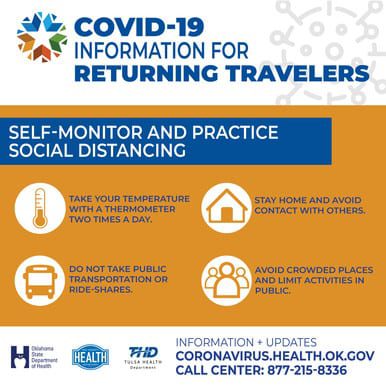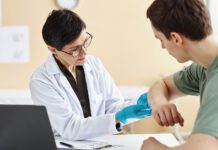County health departments, including OKC-County and Tulsa Health Departments, do not offer testing for COVID-19 (coronavirus).
Any individual who develops symptoms such as fever, cough, and/or difficulty breathing, and has been in close contact with a person known to have COVID-19 or has recently traveled from an area with ongoing spread of COVID-19 should contact their health care provider or the COVID-19 hotline at 877-215-8336 for recommendations.
Before going to a doctor’s office, call ahead and discuss symptoms. If you are sick with a fever or cough and have a higher risk for complications from severe respiratory infections (age 60+, have a chronic medical condition or are pregnant), call your health care provider and ask if you need to be evaluated in person. Other people with mild illness who are concerned about their health can call their health care provider to discuss COVID-19 testing and other possible reasons for their illness.
The health care provider, in consultation with public health officials will determine if the individual meets the proper case definition that warrants testing. The testing is coordinated by the health care provider.
With Spring Break approaching, stay up to date with CDC’s travel health notices related to this outbreak. When returning from travel, to slow the spread of coronavirus disease 2019 (COVID-19) into the United States, CDC is working with state and local public health partners to implement after-travel health precautions. If you have close contact with someone with COVID-19 during travel, you should be prepared to stay home to self-monitor and avoid contact with others for up to 14 days after travel.
CDC does not generally issue advisories or restrictions for travel within the United States. However, cases of COVID-19 have been reported in many states, and some areas are experiencing community spread of the disease. Crowded travel settings, like airports, may increase your risk of exposure to COVID-19, if there are other travelers with COVID-19.
If you have recently traveled to an area with ongoing spread and you develop a fever and symptoms of respiratory illness, such as cough or difficulty breathing, call your health care provider for recommendations.
The public can help:
- Do not go to the emergency room unless essential. Emergency rooms need to be able to serve those with the most critical needs. If you have symptoms like cough, fever or other respiratory problems, contact your regular doctor first.
- Stay home when you are sick.
- Wash your hands often with soap and water for at least 20 seconds, especially after going to the bathroom; before eating; and after blowing your nose, coughing, or sneezing. Help young children do the same.
- Stay away from people who are ill, especially if you are 60 and older or have underlying health conditions such as diabetes, heart disease, lung disease or a weakened immune system.
- Avoid touching your eyes, nose, and mouth with unwashed hands.
- Limit close contact, like kissing and sharing cups or utensils, with people who are sick.
- Clean and disinfect frequently touched objects and surfaces using a regular household cleaning spray or wipe.
- Cover your cough or sneeze with a tissue, then throw the tissue in the trash. If you do not have a tissue, use your sleeve (not your hands). Healthy individuals do not need masks; they are reserved for those who are ill to prevent the spread of germs and healthcare workers.
- Face masks should only be used by people who show symptoms of COVID-19 to help prevent the spread of the disease to others. The purpose of a face mask is to prevent droplets from sneezing and coughing from becoming airborne.
- Stay informed. Information is changing frequently. For more information, view the CDC update here.

























